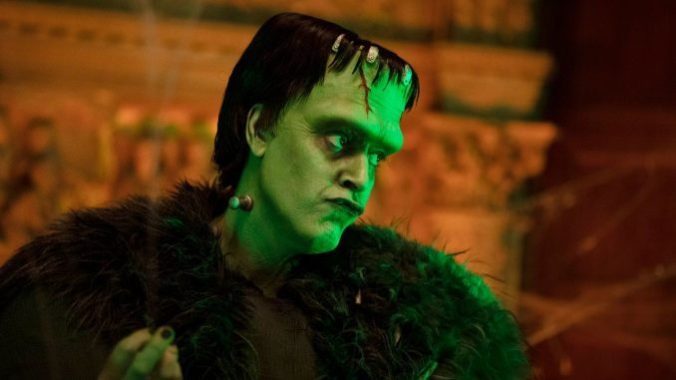Rob Zombie’s Munsters Is a Miracle

On the surface, The Munsters might seem out of step with what you might expect from Rob Zombie. But being out-of-step is kind of his bag. The hard rocker turned House of 1000 Corpses director has remained something of a notorious underdog on the fringes of the film industry, having built up a loyal cult fanbase across his nearly 20-year filmmaking career while staying largely on the bad side of critics and general audiences. It’s true that Zombie’s films aren’t for everyone—they are exercises in excess and bad taste, indulge in gore, introduce unlikeable characters who espouse uncanny, inhuman dialogue, and align us with the monsters just as much as their victims.
So, when the news came that Rob Zombie was helming a Munsters film, many didn’t know what to make of it. Longtime Zombie fans (like me) were elated that the director would get to lead a feature-length adaptation of a property he is known to hold very close to his heart, but still a little uncertain of exactly how he was going to go about it. Zombie has always existed comfortably within the MPAA’s rating of R, notorious for his upsetting depictions of hardcore violence. Zombie naysayers, meanwhile, derogatorily questioned the director of The Devil’s Rejects making a filthy, perverse white-trash iteration of a beloved ‘60s family sitcom, one inevitably starring his wife, Sheri Moon, whom he is devoted to showcasing in all of his films. But those who have affection for Zombie’s work and understand his artistic sensibilities knew from the start that there was no one better to do a remake of The Munsters than Zombie, whether he wanted to reimagine the series as R or PG.
Rob Zombie loves monsters, but his films are made the most uncomfortable by how the director extends his empathy—how he’s curious in depicting the effects of violence just as much as he is in inflicting it. As Willow Catelyn Maclay notes, Zombie creates “a lived-in quality for his characters that complicates our relationship to the violence on-screen.” As far back as his debut House of 1000 Corpses, Zombie has aimed to articulate that the victims of his villains and antiheroes—the latter his usual choice of protagonist—should be mourned by us after we’ve watched them be torn apart.
Like the cheerleaders in Corpses or the traveling band in The Devil’s Rejects, these future corpses, mangled and maimed for our (voyeuristic) entertainment, had lives that have been cut short. The kidnapping of Charly (Sheri Moon), final girl of 31, and her night-long battle against bloodthirsty clowns might signify mindless torture, but there is genuine pathos to her character, her journey and her transformation from the violence inflicted upon her and her friends. Some described Zombie’s take on Halloween as adding extraneous backstory, ruining the unknowable character of Michael Myers. Instead, it adds a queasy dimension to Laurie Strode and the emotional texture of the narrative, even more so in Halloween II. In each of his films, Zombie wants us to reckon with what we’re watching. In an age dominated by true crime, it’s a worthwhile reckoning.
This empathy is just one part of what makes Zombie’s films hard to swallow, what has somewhat isolated him as a filmmaker and what makes his work so distinct from the rest of contemporary horror. In 2022, it’s a genre too often preoccupied with literalizing the theme of “trauma” to the point where it’s rendered hollow and where the horror is forced to take a backseat. As perhaps most blatantly recognized in his two Halloween films and The Lords of Salem, Zombie can tackle topics like trauma and addiction thoughtfully without sacrificing genre, through creating a cinematic environment where the horror of violence and suffering is not purely metaphorical, but real.
In the wake of troubled productions and meddlesome studios on both of his Weinstein-produced Halloween remakes, Zombie has been forced to retreat further to the filmmaking outskirts. More recently, he has had difficulty getting his films made at all. His follow-up to Halloween II, an R-rated animated film entitled The Haunted World of El Superbeasto, had a long road to its eventual direct-to-video release, while The Lords of Salem received backing from Blumhouse (a microbudget of $1.5 million). Most distressingly, 2016’s 31 was financed through fan-backed crowdfunding, and his Rejects threequel, 3 From Hell (another shoestring budget), received an extremely limited, three-night release through Fathom Events before dropping on VOD.
This all funnels into Zombie’s newest feature, his Netflix adaptation of the The Munsters, a family-friendly American sitcom from the 1960s about the goofy, supernatural Transylvanian clan who struggle to fit in among the suburbia of their neighborhood on Mockingbird Lane. If you’re well-acquainted with Zombie, it’s as if his career has been leading up to this.
-

-

-

-

-

-

-

-

-

-

-

-

-

-

-

-

-

-

-

-

-

-

-

-

-

-

-

-

-

-

-

-

-

-

-

-

-

-

-

-








































